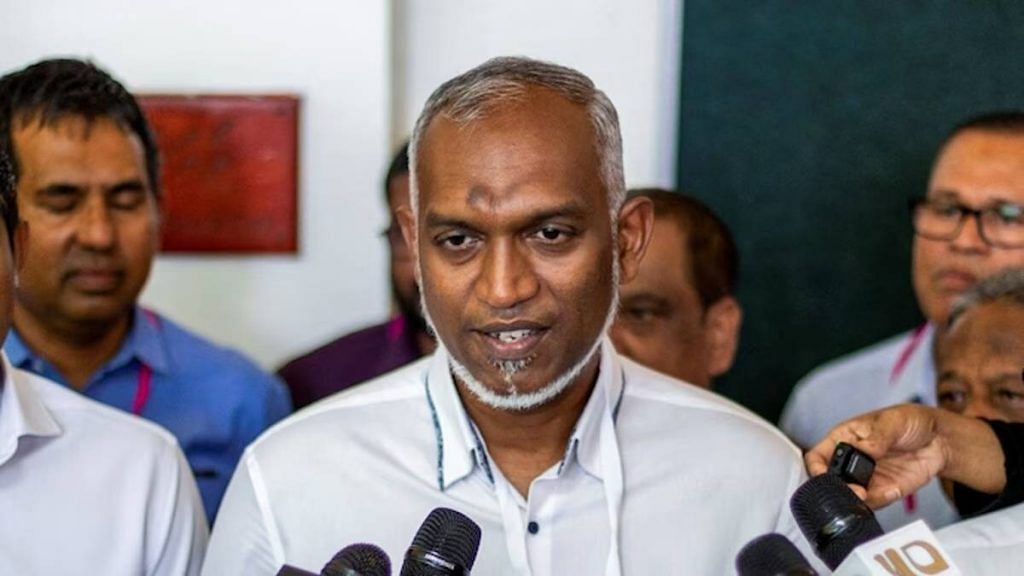New Delhi: Following his victory in the elections this week, Maldivian president-elect Mohamed Muizzu Wednesday vowed to immediately remove all foreign soldiers, including 75 unarmed Indian military personnel, from the islands.
However, if the president-elect intends to maintain stable ties with New Delhi, negotiations will take place and any such removal will occur over a period of time, according to Aditya Gowdara Shivamurthy, associate fellow at Observer Research Foundation’s strategic studies programme.
“While Muizzu has emphasised that India-Maldives ties will be based on the principle of respect for sovereignty, if he wants to maintain a good relationship between the two countries, then negotiations will take place through diplomatic channels. Removal of troops cannot be an overnight process,” Shivamurthy told ThePrint.
“We will have to wait and see how such negotiations will take place,” he added.
The Ministry of External Affairs (MEA) declined to comment on the removal of troops, with spokesperson Arindam Bagchi stating that India is “looking forward to engaging with the new administration in Maldives”.
“The focus of our partnership with the Maldives has always been on capacity-building and working together to address our shared challenges and priorities, including security challenges,” Bagchi told reporters Thursday.
Muizzu’s People’s National Congress-Progressive Party of Maldives (PNC-PPM) coalition has been stirring anti-India sentiment over the past few years, especially through its “India Out” campaign started in 2020, and solidified the majority with 54 percent votes in the election held last month.
Muizzu is part of the pro-China camp and was a minister of housing and infrastructure during the Abdulla Yameen administration (2013-2018), which was succeeded by the India-friendly Ibrahim Solih government.
Also Read: Churning in Maldives raises Delhi’s stakes in Indian Ocean. Why Modi should rule the waves
India-Maldives cooperation
India has maintained a military presence in Maldives over the past few decades, consisting of 75 troops as well as two helicopters and a Dornier aircraft, according to the Maldives National Defence Force (MNDF).
These Indian troops are unarmed and comprise military engineers, trainers and pilots responsible for operating the aircraft and helicopters.
India had reportedly leased two Dhruv helicopters to Malé in 2010 and 2013, primarily for emergency medical evacuation and to conduct search and rescue operations.
The lease agreements for the choppers had expired in 2018 and then Maldives president Abdulla Yameen asked New Delhi to take them back, but after Solih came to power later that year, these demands were nullified.
Interestingly, it was under the Yameen government that the two countries signed a Comprehensive Action Plan for Defence in 2016, under which the Maldivian president requested for the UTF harbour and a Dornier aircraft, according to the MEA.
However, when India provided the Dornier aircraft in September 2020, Yameen, then an opposition leader, launched the “India Out” campaign along with other leaders and claimed that New Delhi was undermining the sovereignty of Maldives.
The Dornier aircraft strengthened MNDF’s surveillance capabilities of the Exclusive Economic Zone (EEZ) of the Indian Ocean archipelago.
Further, seven MNDF personnel, including pilots, air observers and engineers, are currently being trained to operate the Dornier by the Indian troops, as part of the 2016 action plan.
Many agreements between New Delhi and Malé include the training of Maldivian personnel by Indian troops. However, experts note that due to logistical issues from both ends, many such promises have not been met.
“Based on the comments of Muizzu’s advisers so far, he wants to retain the equipment and infrastructure but expel the troops whom he sees as a threat to Maldivian sovereignty,” Shivamurthy said.
Defence and security have been essential spheres of cooperation between the two countries over the past few decades. Apart from stationing troops, India has also been closely involved with the island nation in the construction of a naval facility and port in Uthuru Thilafalhu.
The facility would act as a maintenance and repair hub and allow the MNDF to strengthen its maritime security capabilities and repair ships and other vessels, which were earlier sent to India and abroad.
In May, India also handed over a fast patrol vessel and a landing craft to the MNDF. However, these facilities and vessels are being operated by the Maldivian Coast Guard, rather than Indian troops.
(Edited by Nida Fatima Siddiqui)
Also Read: Maldives is a test case for India’s strategic economic quest, and for Trump’s Indo-Pacific idea
